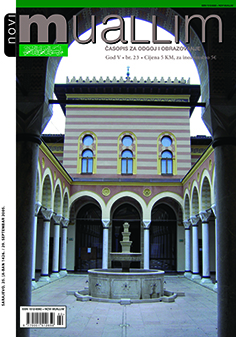MAHMUD DARWISHTHE CORYPHAEUS OF THE PALESTINIAN RESISTANCE POETRY
DOI:
https://doi.org/10.26340/muallim.v6i23.1175Abstract
Mahmud Darwish is probably the most prominent representative of the Palestinian resistance poetry and is well known to the Arabic readers for his inspirational and heroic love for Palestine. He began writing poetry as a young man. His first book of poetry, Asafeer billa ajneeha, was published when he was nineteen. During his life in Haifa, he was a journalist and translator for Al-Jadid and an editor of Al-Ittihad magazine, published by the “Rakah” communist party. He moved to Cairo in 1971 and started working for the leading Egyptian newspapers Al-Ahram. He moves to Beirut in 1973 and soon joins the Palestinian Liberation Organization (PLO). He won numerous prizes and international awards. He was greatly influenced by Al-Mutanabby and the Mahjeer poets as well as by the modern poets like Qabbani and Al-Sayyab. From among the Western poets, the greatest influences were Garcia Lorca, Pablo Neruda, Yeats, Derec Walcott and Polish poets, most of all Symborska. Darwish founded and edited a literary magazine Al-Carmel (1981). While still recovering from a heart attack (1984), he was unanimously elected president of the Organization of the Palestinian Journalist and Writers. He became a member of the highest Executive Committee of the PLO (1987), only to resign later over his disapproval of the Oslo Accords. Currently, he spends most of his time in Ramalah.
Downloads
Published
How to Cite
Issue
Section
License
Naknada:
a. Časopis ne naplaćuje naknadu za obradu članaka (APC) i naknadu za podnošenje članaka.
Autori koji objavljuju u ovom časopisu pristaju na sljedeće uvijete:
- Autori zadržavaju autorska prava i pružaju časopisu pravo prvog objavljivanja, pri čemu će rad jednu godinu po objavljivanju biti podložan licenci Creative Commons imenovanje koja omogućuje drugima da dijele rad uz uvijet navođenja autorstva i izvornog objavljivanja u ovom časopisu.
- Autori mogu izraditi zasebne, ugovorne aranžmane za ne-ekskluzivnu distribuciju rada objavljenog u časopisu (npr. postavljanje u institucionalni repozitorij ili objavljivanje u knjizi), uz navođenje da je rad izvorno objavljen u ovom časopisu.


